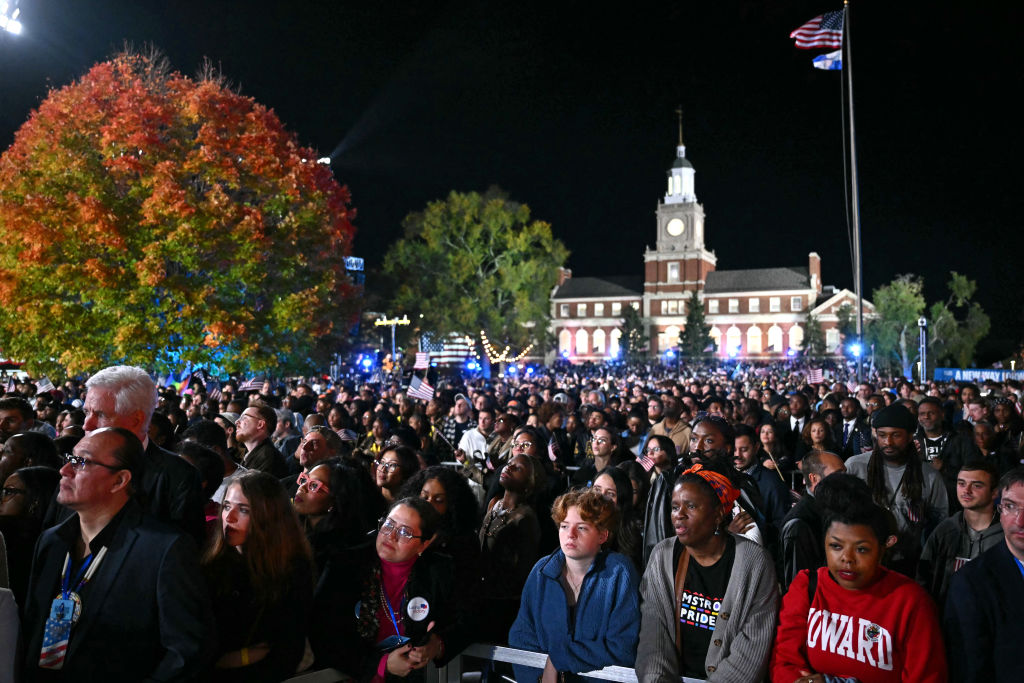WASHINGTON, D.C.—When Vice President Kamala Harris’ watch party at Howard University began, attendees were line dancing.
The music was blaring, and those who came to celebrate a presidential campaign noted for its embrace of “joy” were, well, joyful. Entertained by various student musical groups from the historically black university, the crowd was full of hope for a Harris victory and anticipation for seeing in-person the first woman elected to the presidency.
But that was before results in battleground states began to take shape. As the tallies came in, the worse it looked for the Democrats' chances to retain the White House. Returns from North Carolina and Georgia looked favorable for Donald Trump, and the New York Times’ needle moved steadily in the former president’s direction.
Still, you wouldn’t know it from being at Harris’ watch party, where the atmosphere seemed a world apart from the broader political discourse. The crowd outside of Frederick Douglas Hall at the vice president’s alma mater danced to such songs as “Alright” by Kendrick Lamar. Attendees cheered when CNN called states for Harris and booed when the network added states to Trump’s column.
In the VIP section near the stage, elected officials and other special guests of the campaign looked increasingly downcast, and soon the pessimism seemed to spread to the general admission section. To cap off the sense of reality setting in, CNN turned to correspondent Abby Phillip, who was live at the rally. She reported that Harris campaign manager Jen O’Malley Dillon sent a memorandum to staff focusing the vice president’s hopes on the “Blue Wall” states of Wisconsin, Pennsylvania, and Michigan.
“While we continue to see data trickle in from the Sun Belt states, we have known all along that our clearest path to 270 electoral votes lies through the Blue Wall states,” she wrote. “And we feel good about what we’re seeing.”
O’Malley Dillon might have, but attendees did not. As the night grew colder, so did the crowd. Smiles faded, and there was little more dancing. About 12:45 a.m., after CNN called North Carolina and Georgia for Trump, Democratic National Committee senior adviser Cedric Richmond announced to the crowd that Harris would not make an appearance.
“We still have votes to count. We still have states that have not been called yet,” he said. “We will continue overnight to fight to make sure that every vote is counted, that every voice has spoken, so you won’t hear from the vice president tonight. But you will hear from her tomorrow.”
VIPs quickly filed out of the venue after Richmond made his brief announcement, but The Dispatch caught up with Rodney Ellis, a county commissioner from Harris County, Texas, and asked how he was feeling about the results.
“Nervous,” he said, “but it's not over with. I do remember we didn't know last go-round until Saturday what happened, so keep the spirits up. I’ll be back tomorrow.” He added that Democrats “still have a shot.”







Please note that we at The Dispatch hold ourselves, our work, and our commenters to a higher standard than other places on the internet. We welcome comments that foster genuine debate or discussion—including comments critical of us or our work—but responses that include ad hominem attacks on fellow Dispatch members or are intended to stoke fear and anger may be moderated.
With your membership, you only have the ability to comment on The Morning Dispatch articles. Consider upgrading to join the conversation everywhere.